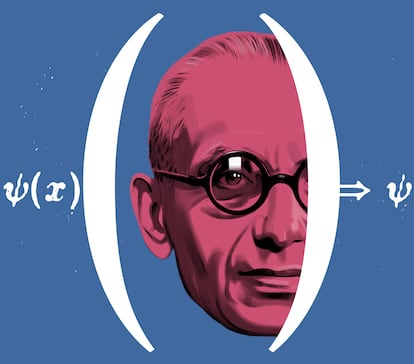Kurt Gödel and the U.S. Constitution’s loophole
Chance and paranoia shaped the life of the Austrian scientist and friend of Albert Einstein. His work has been key in the development of software engineering

Having a gifted mind and mental abilities superior to that of most mortals does not mean that one cannot suffer from serious mental problems. Austrian mathematician and philosopher Kurt Gödel is a case in point. He was born in 1906 in Brno, the capital of Moravia, which at that time formed part of the Austro-Hungarian Empire. After World War I, the region was annexed to Czechoslovakia, which was a problem for Gödel since his family, like a large part of the city’s population, spoke German. This led him to go into exile in Vienna and apply for Austrian citizenship. At the age of 32, with the Third Reich’s annexation of Austria, he became a German national.
Gödel found his calling during a lecture by mathematician David Hilbert (Königsberg, 1862-1943) about the consistency of mathematical fields, and he decided to devote the rest of his life to the study of logic. This pursuit led to his greatest contributions: two incompleteness theorems, which were published a year after he defended his doctoral thesis in Vienna in 1931. Gödel’s contributions have been fundamental to the development of logic and were later applied in many ways in the fields of mathematics and software engineering.
But the vagaries of politics continued to influence his life. Gödel came from a Catholic family and never showed any interest in politics. But one of his professors was murdered by a Nazi, which greatly affected him. With the annexation of Austria, his position as a university professor had to be re-examined, and he assumed that his friendships and relationships with many Jewish scientists from the Vienna Circle would weigh heavily against him at his trial; in addition, he might be called up by the German Army at any moment. In 1940, he and his wife fled Vienna via the Trans-Siberian railroad to Vladivostok; from there, they traveled to Japan and from Japan they sailed to San Francisco (World War II had already started in Europe, but Japan did not attack the United States until December 1941). Once Gödel arrived in California, he traveled across the country by train to Princeton University in New Jersey, where he spent the rest of his scientific career.
Gödel was a fellow student and close friend of Einstein’s, with whom he took long walks chatting in his native German. Einstein even declared that he was no longer interested in research and that he only went to campus to speak with Gödel. Gödel’s behavior was always peculiar, and he was plagued by paranoia. In 1947, he took the test to become a U.S. citizen, sponsored by Einstein and their mutual friend, the economist Oskar Morgenstern. When he appeared before the judge, after answering the first questions satisfactorily, he told the judge that he had analyzed the U.S. Constitution and that it had a drafting problem, which allowed the U.S. to legally become a dictatorship or a fascist state, as had happened in Austria. Gödel’s two friends were horrified because they saw that his citizenship was in jeopardy, and he could be deported to Europe. The judge himself stopped Gödel by uttering the pragmatic phrase “Oh God, let’s not get into this” and ending the examination before the logician could say anything more. He never wrote down the flaw he had detected in the Constitution. Today, this question is known as Gödel’s loophole. Several authors have tried to decipher the U.S. Constitution’s enigmatic problem. Some say that it could possibly refer to the fact that Article V of the U.S. Constitution describes the process of amending the founding document, which would allow for an amendment to Article V itself and facilitate any subsequent constitutional change. But that is all pure speculation. Morgenstern described the situation as he remembered it, and it seems that the episode was so embarrassing that Gödel was never asked to restate his theory... just in case.
J. M. Mulet is a professor of Biotechnology.
The illogical final chapter
— Gödel's sad end was caused by his deteriorating mental state. In 1938, against the will of his parents, he had married the divorced ballerina Adele Pokert, eight years his senior, with whom he remained all his life. He developed persecution mania and was convinced that someone wanted to poison him, so he would not accept any food that had not been cooked by Adele. In 1977, his wife was hospitalized for six months. Kurt Gödel passed away in January 1978 due to severe malnutrition, since he had refused to eat any food during all that time. He weighed 30 kilos at the time of death. The great teacher of logic died due to behavior that defied all logic.
Sign up for our weekly newsletter to get more English-language news coverage from EL PAÍS USA Edition
Tu suscripción se está usando en otro dispositivo
¿Quieres añadir otro usuario a tu suscripción?
Si continúas leyendo en este dispositivo, no se podrá leer en el otro.
FlechaTu suscripción se está usando en otro dispositivo y solo puedes acceder a EL PAÍS desde un dispositivo a la vez.
Si quieres compartir tu cuenta, cambia tu suscripción a la modalidad Premium, así podrás añadir otro usuario. Cada uno accederá con su propia cuenta de email, lo que os permitirá personalizar vuestra experiencia en EL PAÍS.
¿Tienes una suscripción de empresa? Accede aquí para contratar más cuentas.
En el caso de no saber quién está usando tu cuenta, te recomendamos cambiar tu contraseña aquí.
Si decides continuar compartiendo tu cuenta, este mensaje se mostrará en tu dispositivo y en el de la otra persona que está usando tu cuenta de forma indefinida, afectando a tu experiencia de lectura. Puedes consultar aquí los términos y condiciones de la suscripción digital.








































